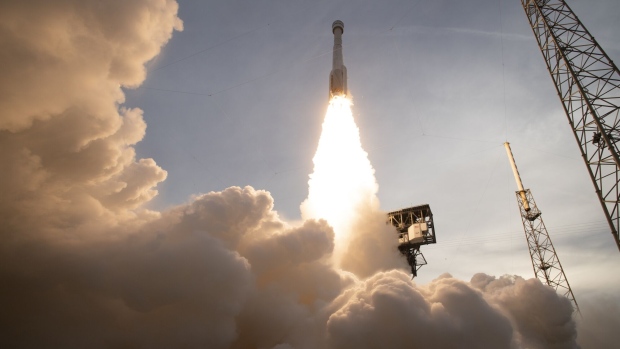Oct 25, 2023
Rocket Launch Company ULA Is Ready-Made for a Buy, CEO Says
, Bloomberg News

(Bloomberg) -- United Launch Alliance LLC’s chief executive officer views his firm as an attractive acquisition target given its deep backlog, reliable profits and a new rocket poised to challenge SpaceX.
“If I were buying a space business, I’d go look at ULA,” CEO Tory Bruno said in an interview at Bloomberg’s headquarters in New York. “It’s already had all the hard work done through the transformation. You’re not buying a Victorian with bad plumbing. It’s all been done. You’re coming in at the end of the remodel, so you can focus on your future.”
Bruno declined to comment on whether or not ULA is looking for a prospective buyer. “The only scenario where I would be able to talk about an M&A is after it happened and it was announced,” he said about a merger or acquisition.
It’s unclear who might be in the market for a rocket launch company with sensitive US government contracts. But ULA works with many firms, including Jeff Bezos’ Blue Origin LLC, which supplies Vulcan’s engines. “Your major suppliers are always really your strategic partners,” Bruno told Bloomberg TV.
Blue Origin did not immediately return a request for comment.
Joint Venture
Bruno said that ULA’s corporate structure has been a challenge for the company’s decision-making over the years. United Launch Alliance is a joint venture between defense heavyweights and competitors Lockheed Martin Corp. and Boeing Co. They formed ULA in 2006 to provide assured access to space for the US Department of Defense’s satellites.
“Our ownership structure is complicated,” Bruno said. “It has served us well up to this point. But I would not tell you that it’s agile.” Any sale of ULA would be have to be decided by its board, which Bruno isn’t part of. The board seats are equally split between Lockheed and Boeing.
ULA is working to debut its Vulcan rocket as early as Dec. 24. Vulcan, which draws on technology from ULA’s legacy Atlas and Delta rockets, is central to the company’s ability to cement its leadership in the lucrative market for US government missions and capture a bigger slice of the fast-growing commercial satellite market against Elon Musk’s Space Exploration Technologies Corp.
The rocket is meant to usher in a new chapter for the Centennial, Colorado-based firm, one where the company is an equal launch provider for national security and commercial payloads. Bruno said that will approach a 50/50 split thanks to ULA’s contract to launch a swath of Amazon.com Inc.’s internet-from-space satellite constellation.
Read More: Amazon’s First Week for Kuiper Satellite Prototypes a Success
When it was formally announced in 2015, Vulcan was supposed to fly as early as 2019. But its launch date has been pushed again and again, in large part due to late delivery of Blue Origin’s BE-4 engine.
“I planned on them being about a year late, and I had accommodations for them being two years late,” Bruno said. “And it’s been more like three years late.”
After delivering its first engines to ULA in late 2022, Blue Origin has now moved to the production phase of engine making, with plans to ramp up over the coming years, Bruno said. Ultimately, Bruno wants Blue Origin to deliver one BE-4 a week, but at the moment he says the company is averaging one BE-4 every month. Bruno said he spoke to Bezos earlier this month about the company’s production.
Right now, ULA is targeting a three-day launch window for its first launch of Vulcan that spans from Dec. 24 to 26. For this mission, ULA has an instantaneous launch window each day, meaning Vulcan must launch within a one-second time frame or push to the next day.
The company plans to fly a robotic lunar lander for Astrobotic Technology Inc. on the flight. It will also be the first of two planned launches needed for US military certification.
If all goes well with its December debut, ULA aims to fly as many as seven Vulcan launches in 2024, depending on deliveries of its payloads. Then in the first half of 2025, the company plans to double that cadence, leading to a pattern of launches every two weeks later that year.
“We’re in a really great position with a very, very large backlog of orders,” Bruno said. “We’re profitable – really the only launch company in the world that is consistently profitable.”
--With assistance from Ed Ludlow.
©2023 Bloomberg L.P.





